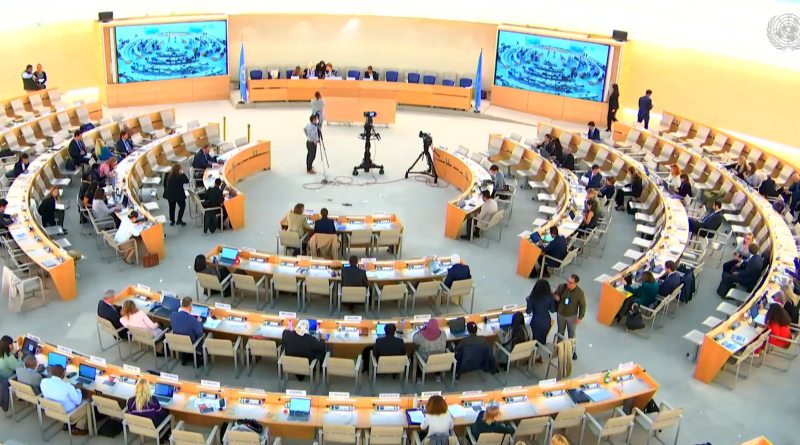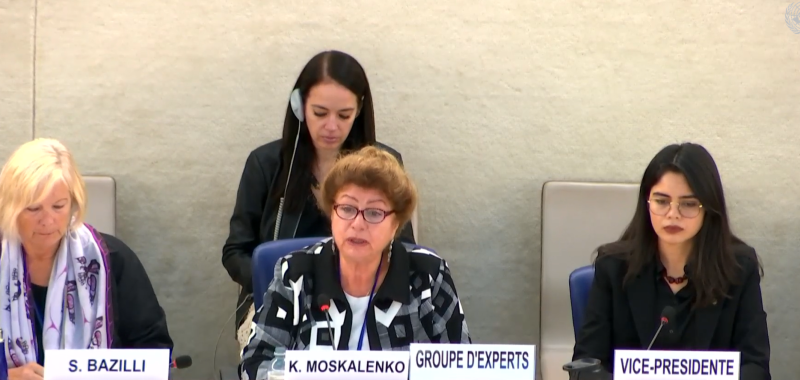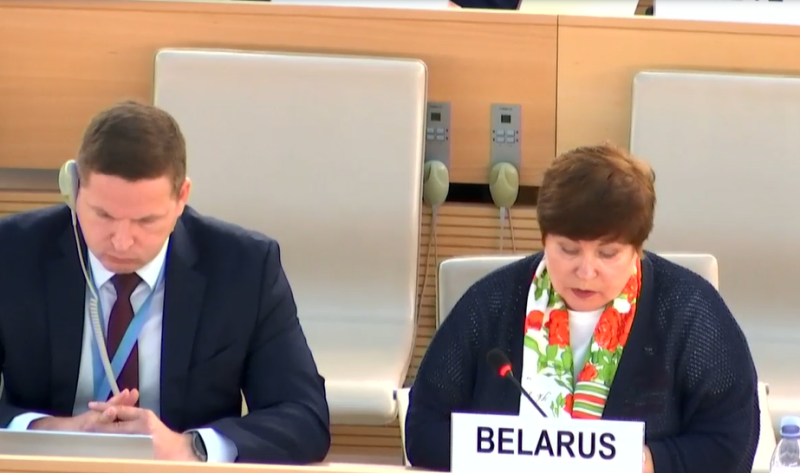"Suppression of dissent." Independent experts on the human rights situation in Belarus spoke at the UN
Within the framework of the 57th session of the UN Human Rights Council, an interactive dialogue was held with respect to the group of independent experts on the human rights situation in Belarus (in accordance with HRC resolution 55/27). Viasna reports what independent experts, the delegation of Belarus, human rights activists said, and which positions different states ultimately supported.

- Screenshot: 57th Regular Session of Human Rights Council
Independent experts
The group of independent experts on the human rights situation in Belarus was represented by Karyna Maskalenko and Susan Bazilli.
In March 2024, the Human Rights Council presented the group with a comprehensive mandate to strengthen accountability, which combines investigation and fact-finding, compliance with evidence, interaction with stakeholders, and recommendations on finding ways to bring to justice for human rights violations and related crimes committed on the territory of Belarus since May 2020.
The group of experts intends to conduct its own investigation, independent of OHCHR and other authorized bodies of the Human Rights Council.
Karyna Maskalenka presented to the UN Human Rights Council the oral information that the Council requested in its resolution 55/27 on the human rights situation in Belarus:
"While we are well aware that we are conducting a human rights investigation in accordance with our mandate, we nevertheless intend to develop a methodology aimed at ensuring that the information collected and stored creates the best conditions for becoming acceptable in court proceedings. We are guided by the principles of objectivity and impartiality. It is in this direction that we intend to cooperate voluntarily and in good faith with the Government of Belarus, including by requesting access to its territory. We continue to hope for a positive response to our request and once again appeal to the Government of Belarus to fully cooperate with our investigation," Maskalenka said.

- Karyna Maskalenka (in the center). Screenshot: 57th Regular Session of Human Rights Council
The expert then turned to the latest developments related to the human rights situation in Belarus.
"The violation of human rights, which is relevant to our mandate, has been observed in Belarus since May 2020. These include: arbitrary deprivation of the right to life and liberty, torture, ill-treatment, including sexual and gender-based violence, denial of the right to due process and fair trial, arbitrary denial of the right to enter one's own country, violation of the rights to freedom of expression, peaceful assembly, association, and equal protection before the law. Sexual and gender-based violence is clearly underreported, but there is reliable information that some women and men in custody are threatened with rape and subjected to forced nudity and searches. Lukashenka recently pardoned dozens of people who were convicted of participating in the 2020 protests. While we welcome the announcement of the release of these individuals, we also note that they represent only a small share of those who have been arrested.
[...]
Most of the opposition is either in prison or was forced to immigrate after the 2020 elections. The State of Belarus is trying to stifle any desire to participate in activities that may be perceived as criticism of the government. This is stifling political debate as Belarus approaches the 2025 presidential elections. We intend to closely monitor their progress. The main responsibility for establishing investigations and violations of human rights lies with the State of Belarus. To date, we are not aware of a single case where those responsible for this would have been prosecuted for possible involvement in human rights violations since 2020. Instead, the Belarusian authorities continue to maintain the vicious circle of impunity that prevails in the country, suppressing all forms of dissent, criminalizing those who only exercise their fundamental rights and freedoms, in particular freedom of expression. We will continue to monitor the human rights situation in Belarus and collect data for accountability purposes, including through the principle of universal extraterritorial jurisdiction. We will present a comprehensive report on our findings in March 2025."
The delegation of Belarus
Then the delegation of Belarus took the floor. It was headed by Larysa Belskaya.

- Larysa Belskaya. Screenshot: 57th Regular Session of Human Rights Council
"The country situations initiated by a group of Western countries in the UN Human Rights Council do not correspond to the reality of the countries in consideration. Belarus is just such a case. [...] It is very convenient to show taxpayers international resolutions and mandates to explain why the extremists who are trying in vain to destroy the Belarusian state should be supported. [...] Let's call a spade a spade. Firstly, Belarus has always been guided by its national interests [...] and did not integrate into the imposed model of domestic and foreign policy focused on the geopolitical ambitions of the West. Secondly, to change this situation, the West is trying to interfere in our internal affairs using a wide range of tools, including politically motivated resolutions and mandates of the HRC, illegal economic sanctions, media technologies manipulating public consciousness, disinformation on the situation in the country and the policy of the Belarusian authorities. Thirdly, various extremist structures that are dependent on the West are actively funded and advertised," Larysa Belskaya said.
Countries that supported the independent experts
Delegations from different countries interested in asking questions to the expert group or commenting on the oral presentation made their statements. Among the countries that supported the independent experts was Finland, speaking from the group of Nordic and Baltic countries. Finland noted its concern about the deteriorating human rights situation.
"We support the people of Belarus in their demands for democracy. We support the resolute and courageous work of Viasna and other civil society organizations," said Finnish Foreign Minister Elina Valtonen. "We call on the state to immediately stop systemic oppression. We condemn the ill-treatment of political prisoners and call for their immediate and unconditional release, as well as effective rehabilitation. We strongly condemn Belarus' support for Russia in its aggressive war against Ukraine. We call on Belarus to stop its participation in the illegal deportation and forced displacement of Ukrainian children carried out by Russia."

- Screenshot: 57th Regular Session of Human Rights Council
The delegation of the European Union also welcomed the independent experts and expressed its concern that over 1,300 political prisoners remain in detention in terrible conditions.
"We call on the authorities to release, among others, Maryia Kalesnikava, Viktar Babaryka, and Mikalai Statkevich," the European Union noted and asked independent experts for more detailed information on reports of denial of due process and harassment of lawyers.
Luxembourg also supported the independent experts on behalf of three countries: Belgium, the Netherlands, and Luxembourg.
"We call on the Belarusian authorities to immediately release all political prisoners, in particular Ales Bialiatski, Marfa Rabkova, Andrei Chapiuk, and Nasta Loika," the representative of the three countries said and asked independent experts about the persecution Belarusians face abroad.
Albania, along with Moldova and Spain, raised the issue of the death penalty:
"Belarus should not remain the only country in Europe that has political prisoners. It is also the only country that carries out the death penalty. We have repeatedly called for a moratorium."
Similar rhetoric was also voiced by Switzerland, Liechtenstein, Poland, the Czech Republic, Germany, Ireland, the United States, Austria, France, Romania, Bulgaria, Montenegro, Greece, Ukraine, and Slovakia.
Countries that did not support the independent experts
North Korea recalled that Belarus continues to cooperate with the UN system and called the existence of the mandate of independent experts on Belarus "a selective politically motivated approach under the pretext of protecting human rights."
In its speech, the Russian Federation spoke about "using human rights issues to put pressure on Minsk" and "whipping up anti-Belarusian hysteria."
"The mechanisms of the HRC, in this case the so-called independent experts, are shamelessly exploited," the Russian Federation said. "We are convinced that any contradiction within the country can be resolved within the country."
China "respects the sovereign choice of economic development paths and the territorial integrity of Belarus" and opposes "interference in internal affairs by foreign entities under any pretext."

- Screenshot: 57th Regular Session of Human Rights Council
Similar attitudes were expressed by the Islamic Republic of Iran, Cuba, Sri Lanka, Eritrea, The Lao People's Democratic Republic, Zimbabwe, Venezuela, Nicaragua, and the Syrian Arab Republic. Meanwhile, Azerbaijan, Kazakhstan, Iran, and Egypt "took note" of the report of independent experts.
What did the human rights defenders say
The non-governmental organizations that spoke at the interactive dialogue fully supported the mandate of the independent experts on Belarus. Among such NGOs are:
National human Rights Association, Article 19, Human Rights house foundation, International Bar Association.

- Screenshot: 57th Regular Session of Human Rights Council
Furthermore, Right Livelihood and Human Rights Center Viasna issued a joint statement:
"As a new cycle of Presidential elections draws near, we remain appalled by the persistent repression of all fundamental freedoms in the country. While we welcome the release of some political prisoners, the reality is that arbitrary arrests continue to occur weekly. Authorities persist in labeling individuals and organizations as extremists or terrorists, trying even those who left the country in absentia, further intensifying the crackdown and silencing dissenting voices.
There remains 1351 political prisoners in the country enduring harsh conditions, and inhumane treatment including torture. According to the latest figures, six of them are held totally incommunicado, for others, communication is extremely limited. Since his imprisonment in July 2021, Human Rights Center Viasna’s Chairman, Ales Bialiatski, has only been able to exchange few postcards with his family.
We cannot let the next Belarusian presidential election be a replay of 2020. International accountability remains crucial. While we continue to call on all concerned States to use their provisions on universal jurisdiction to hold Belarusian authorities accountable for their crimes, we ask the Group of Experts: How do you intend to coordinate with other accountability mechanisms to expand the investigation into gross human rights violations committed in Belarus?"

















